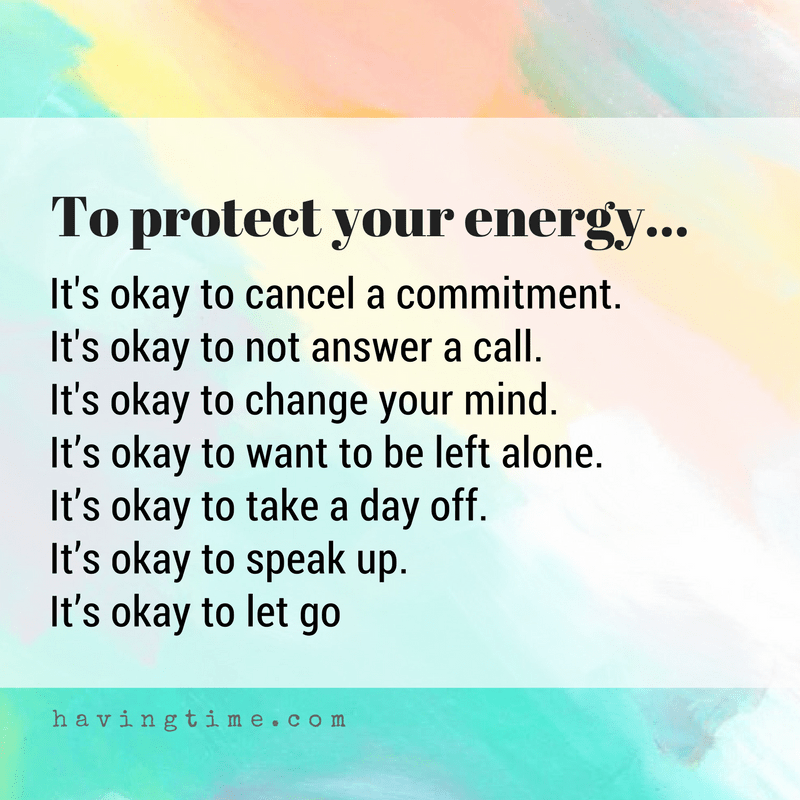To take care of yourself properly, you need to start setting healthy boundaries. But how can you start to overcome feelings of intense guilt and begin to prioritize your own needs? Please, remember that setting healthy boundaries will be the most important self-care action you will ever make because practicing self-care also benefit those around you.

How to Prioritize Your Needs, Set Healthy Boundaries, and Practice Self-Care Without Feeling Guilty
How do you set personal boundaries?
Setting personal boundaries means having enough self-awareness to know what you need at the moment and having the courage to say yes or no when you feel it’s necessary.
Setting healthy boundaries is about understanding what is healthy for you physically, mentally, and emotionally.
There are six types of boundaries:
- Physical boundaries – personal space and physical touch
- Intellectual boundaries – thoughts and ideas
- Emotional boundaries – feelings
- Sexual boundaries – sexuality
- Material boundaries – money and possessions
- Time boundaries – how you prioritize your time
Generally speaking, the key to setting healthy boundaries is to:
- Understand the outcome that you want – what is the end goal?
- Set a personal boundary based on that goal
- Be clear with yourself about setting this particular boundary
- Communicate in a clear, friendly yet firm manner with other people
- If your boundary is not being respected, dare to either restate the boundary or move away from that person or/and situation

3 Steps You Need to Take When You Want to Set Healthy Boundaries
“Love yourself enough to set boundaries. Your time and energy are precious. You get to choose how you use it. You teach people how to treat you by deciding what you will and won’t accept.” – Anna Taylor
Practicing self-care can be challenging since most of us have access to a smartphone, email, and social media. Without much effort, we have instant and constant access to loads of information and other people – which often means instant access to us.
When we allow ourselves to be accessible all the time, how on earth can we find the time to practice self-care? How can we turn off?
As a busy lady boss, I’ve decided to start a self-care practice that begins with setting attainable and realistic boundaries in 3 ways: at home, with work & clients, and with extended family & close friends.
Setting boundaries at home
Setting healthy boundaries is a necessary component of proper self-care; however, it can be challenging if like me, you work from home and have limited physical space for a private home office or if you work in a cubicle.
How can you set personal boundaries at home or in a small office when surrounded by distracting energy?
Focus music is a soothing way to drown out distractions while also increasing productivity. Neuroscience proves that listening to certain music can enhance focus and productivity.
Try the Focus Music playlist by Ryman Music on Pandora, there are no lyrics and the music is upbeat without a lot of distracting Bass and though also soothing, it won’t make you feel sleepy.
Provided your boss is open to your use of headphones at work, listening to focus music can serve as a visual “Do not disturb” to your co-workers too. It’s a win-win.
Set boundaries with work & clients
One of the most significant benefits of freelance work is that I have total control over who I choose to work with. This is especially true of working with clients.
After nearly two decades of doing freelance and contract work, I can tell you that clients or potential clients who repeatedly miss, reschedule or are late for appointments are telling you what type of client they will be, they are telling you that you are not a priority and that they don’t value your time as an asset.
In my experience, poor behavior won’t magically change the moment a client signs a proposal or contract, and it won’t change if you don’t let them know.
“You teach people how to treat you by deciding what you will and won’t accept.” – Anna Taylor
Why should you suffer the anxiety of missed work because a client or co-worker doesn’t recognize the value of your time on this planet? Know your limits and don’t be afraid to set firm boundaries for your time and energy.
A great way to set firm boundaries with clients is to create and share an availability policy that stipulates consequences for missed appointments, e.g., a small fee or percentage added to their invoice. With co-workers, it’s best to start a dialogue – begin with an open discussion about how proper time management benefits everyone.
You owe it to yourself to decide how you want others to treat you, and you must speak up when a client or workmate habitually undervalues your time.
Set boundaries with close friends & family

When I first started working for myself, my Dad, who I love dearly, had the habit of calling me several times a day during working hours. He wanted to talk about his latest outing to the mall or give me updates about his neighbors.
It took some time, several conversations, and an auto-reply text telling him I was busy before he understood that my working remotely requires me to set boundaries with my availability. Of course, I would never turn away an emergency call but outside of a brief text, my daytime hours are reserved for work.
To do your best, shouldn’t you give yourself mental space?
For the sake of your sanity, it’s not cruel or selfish for you to set boundaries with your family and close friends by limiting their access to you so that you can focus on your tasks at hand.
To help you set healthy boundaries with family and close friends, create a system for when you plan to be out of pocket.
I choose to have an auto-reply text letting people know that I’ll get back to them after a specific time; I also put my phone in another room away from my workspace – when at work, you could try keeping your phone in a desk drawer. Set a timer on your phone or calendar reminder when you’re mentally free to check your phone messages and texts.
Making the time and effort to remove distractions, teaching people how you want to be treated, and limiting your accessibility will give you the well-deserved nurturing that you need.

In setting boundaries as a self-care practice, the idea isn’t to burn bridges, on the contrary, by setting boundaries you are permitting yourself to be your best self at home, with your work, and with extended family & friends.
photo source | pexels + giphy

